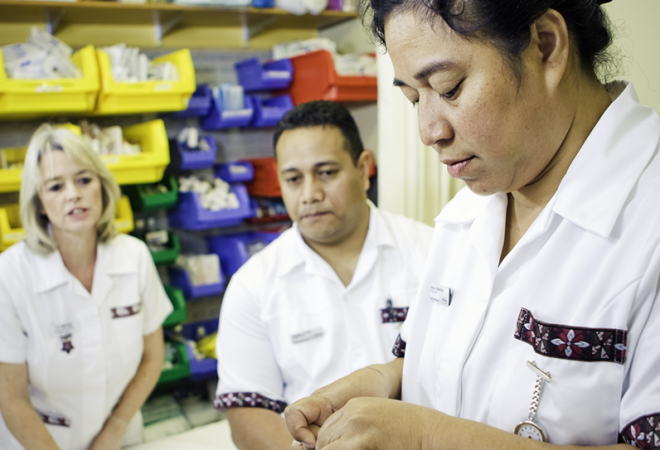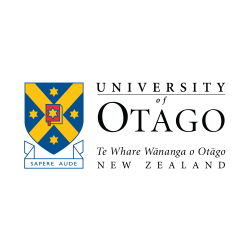
Medicines Clinic – A Novel Opportunity for Understanding Health Literacy
Status
Completed: 22 December 2015
Project Details
A project completed in 2015, undertaken by the University of Otago’s School of Pharmacy, to develop a pilot of public drop-in community-based Medicines and Health Literacy Clinics (MHLCs) with final-year pharmacy students at the University of Otago.
Aims:
The main aims of the project were to:
- offer a patient-centred health information opportunity to improve health literacy in the community
- encourage patients to bring all of their medicines and supplements to a community setting without appointment or cost
- answer patient concerns, verify what is being taken, identify medication interactions or errors and improve aspects of adherence
- provide an authentic learning experience for the students themselves.
Methodology:
The project methodology involved post clinic debriefing conversations, reflection exercises and quarterly survey instruments were used to assess both student understanding and clinic programme achievements.
Team

Stephen Duffull
Project Leader
University of Otago
James Windle
University of Otago
Aynsley Peterson
University of Otago
Rhiannon Braund
University of OtagoStatus
Funding
$39,360.00 (excl GST)
Key Findings
The key findings from the project were:
Impact on practice
The HLMC has had the following impact on the community:
- Improved health literacy for many patients accessing this clinic.
- Improved health outcomes to several patients.
- Attempted to address a previously unknown demand for opportunities within the community to contribute to health outcomes by improvement in health literacy.
- No adverse communication events have been reported from sessions conducted.
Impact on learners
The HMLD has had the following impact on final year pharmacy students attending:
- The School has been able to place approximately a quarter of all final year students into the MHLC over a period of one year.
- Most students read the 3 steps to better health literacy as a resource and found this helpful to their learning.
- Most students gained knowledge around adult health literacy having undertaken readings then attended the MHLC compared with prior knowledge.
- Student learning occurred in implementing the 3 steps to better health literacy approach.
- Students demonstrated moderate confidence levels discussing medication matters with patients.
- A large majority of students reported that their self-confidence in communicating directly to patients during the MHLC had increased.
- Students perceived varying levels of contribution to patient conversations mostly being adequate or fully inclusive.
- All students wished to further participate in future clinics and similarly would recommend other students attend a MHLC.
- Students received unique and valuable clinical tuition from academic pharmacists over the clinic time.
- Students could appreciate academic staff members, who are pharmacists, can contribute directly to patient care in this placement experience.
Impact on the team
The MHLC has had the following impact on academic staff members who attend and manage the placement:
- Provided a chance to share clinical knowledge from past teaching, research and practice experience.
- Created an opportunity to provide direct and immediate positive health outcomes to patients in the local community.
- Allowed the opportunity to formalise staff member’s own learning objectives around adult health literacy for their own continuing professional development.
- Opportunities to bring back these experiences into the classroom.
- Some patients have indicated a willingness to further contribute to the School’s teaching programme back in the classroom setting.
- Contributing roles for team members are both clearly defined and supportive in respect of administrative, clinical and educational responsibilities.
Key Recommendations
The project identified further opportunities for MHLC in the community, the challenges ahead and possible ways in which these may be addressed. These included:
Timetabling | Timetabling clinic sessions that allow for optimal patient attendance at the same time as students can make themselves available from normal curriculum activities. A full curriculum review of the BPharm programme is currently being undertaken and it is expected that this will result in greater flexibility in the programme which should aid MHLC clinic opportunities.
Staff involvement | Increasing academic staff involvement. While each month relevant academic staff who hold annual practicing certificates (APCs) are notified by email of clinic session times and localities, the offer to participate has not been taken up for numerous reasons. Some relate around teaching and research schedule clashes, others are part time and do not work at the University on the scheduled day. Again, it appears that greater flexibility in the way the clinics are managed should provide more opportunity for staff.
Patient availability | Logistic balances between ratios of patients, academic pharmacists and students attending to optimise learning is ongoing and unlikely to be further refined whilst working within the community. Free and accessible clinics held once a month during a fixed time in the community or retirement centres create unpredictable uptake by patients. This may be partly accommodated by the additional introduction of a booked time clinic. However, uptake is likely to improve and become more predictable as the clinic becomes more well recognised within the community.
Other clinic opportunities | The School is actively investigating other clinic opportunities and has recently explored the possibility of running MHLC activities in adjunct to some nurse-led community clinics.
Funding | While the School is keen to continue to run complimentary clinics we believe that these should be funded by the DHB. This is an important service for the community and is especially important in those communities where travel to health care centres is either prohibitive on the basis of cost or lack of available transport. Ultimately the School will not be able to sustain a dramatic increase in clinic opportunities without additional support.
A research report prepared by James Windle, Aynsley Peterson, Rhiannon Braund and Stephen Duffull.
(PDF, 1.89 MB, 61-pages).
- 12 October 2015
A research report prepared by James Windle, Aynsley Peterson, Rhiannon Braund and Stephen Duffull.
(PDF, 936 KB, 8-pages).
- 12 October 2015